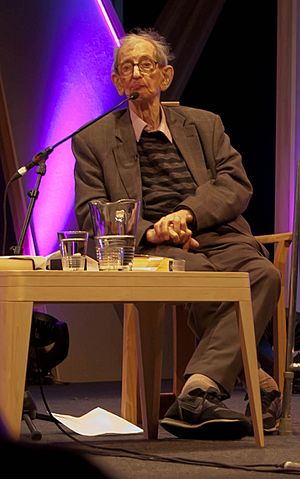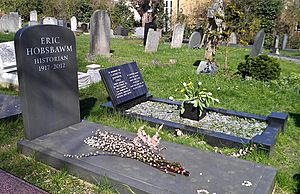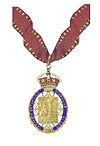Eric Hobsbawm facts for kids
Quick facts for kids
Eric Hobsbawm
|
|
|---|---|

Hobsbawm in 2011
|
|
| Born | Eric John Ernest Hobsbawm 9 June 1917 Alexandria, Sultanate of Egypt |
| Died | 1 October 2012 (aged 95) London, England |
| Occupation | Historian, social theorist and author |
| Citizenship | British |
| Alma mater | King's College, Cambridge |
| Genre | World history, Western history |
| Notable works | The Age of Revolution: Europe 1789–1848, The Age of Capital: 1848–1875, The Age of Empire: 1875–1914, The Age of Extremes: 1914–1991, Bandits, Echoes of the Marseillaise |
| Spouse |
|
| Children | Joshua Bennathan, Julia and Andy Hobsbawm |
Eric Hobsbawm (born June 9, 1917 – died October 1, 2012) was a famous British historian. He wrote a lot about how industrial capitalism (a system where businesses are privately owned), socialism (a system where the community owns and controls production), and nationalism (strong loyalty to one's own nation) grew.
Hobsbawm was a Marxist throughout his life. This means his beliefs about society and politics shaped his historical writings. His most famous books include a series about what he called the "long 19th century" (from 1789 to 1914). These books are The Age of Revolution: Europe 1789–1848, The Age of Capital: 1848–1875, and The Age of Empire: 1875–1914. He also wrote The Age of Extremes about the "short 20th century" (1914–1991). He also helped introduce the idea of "invented traditions", which are customs that seem old but were actually created more recently.
Hobsbawm was born in Alexandria, Egypt. He spent his childhood in Vienna, Austria, and Berlin, Germany. After his parents died and Adolf Hitler came to power, Hobsbawm moved to London with his new family. He served in the Second World War and later earned his PhD in history from the University of Cambridge. In 1998, he received the Order of the Companions of Honour, a special award in Britain. He was also the president of Birkbeck, University of London, from 2002 until his death. In 2003, he won the Balzan Prize for his amazing work on 20th-century European history.
Contents
Early Life and Education
Eric Hobsbawm was born in 1917 in Alexandria, Egypt. His father, Leopold Percy Hobsbaum, was a Jewish merchant from London. His mother, Nelly Hobsbaum, was from an Austrian Jewish family. Even though both parents were Jewish, they were not very religious. Eric spent his early years in Vienna, Austria, and Berlin, Germany. A small mistake at birth changed his last name from Hobsbaum to Hobsbawm. Even though he lived in German-speaking countries, he grew up speaking English first.
In 1929, when Eric was 12, his father passed away. Eric began working as an au pair and English tutor to help his family. In 1931, his mother also died. Eric and his sister Nancy were then adopted by their aunt Gretl and uncle Sidney. Eric was a student in Berlin when the Nazi Party took power in 1933. That same year, his family moved to London. There, Hobsbawm went to St Marylebone Grammar School. Many people thought he was a refugee because he moved from Germany, but he was actually British by birth because of his father's nationality.
Hobsbawm started at King's College, Cambridge, in 1936. He joined the Communist Party of Great Britain through the university's Socialist Club. He did very well in History and became a member of the Cambridge Apostles, a secret intellectual society. He earned his PhD in History from Cambridge University for his work on the Fabian Society. During the Second World War, he served in the Royal Engineers and the Army Educational Corps. He was not allowed to serve overseas because he used a newspaper he edited in the army to ask for a "Second Front" in the war, which was a demand of the Communist Party at the time. He left the military in 1946 to return to Cambridge as a research student.
Academic Career
British intelligence services (MI5) started a file on Hobsbawm in 1942. Their watch on him affected his career for many years. In 1945, he applied for a job at the BBC to make educational broadcasts for soldiers returning home. He was seen as a "most suitable candidate." However, MI5 quickly stopped the appointment. They believed Hobsbawm would use any chance to spread Communist ideas.
In 1947, he became a lecturer in history at Birkbeck College, University of London. Birkbeck was unusual because it did not have strong anti-communist feelings among its staff or students. He became a reader in 1959 and a professor from 1970 to 1982. He became an emeritus professor (a retired professor who keeps his title) in 1982. He was also a Fellow at King's College, Cambridge, from 1949 to 1955. Hobsbawm said that a milder version of "McCarthyism" (a time in the US when people were accused of being communists) happened in Britain. He said, "you didn't get promotion for 10 years, but nobody threw you out."
Hobsbawm helped start the academic journal Past & Present in 1952. He was a visiting professor at Stanford University in the 1960s. In the 1970s, he became a full professor and a Fellow of the British Academy in 1976. He was also made an honorary member of the American Academy of Arts and Sciences in 1971 and a Fellow of the Royal Society of Literature in 2006.
Hobsbawm officially retired from Birkbeck in 1982. He became Emeritus Professor of History and was appointed president of Birkbeck in 2002. He also taught as a visiting professor at The New School for Social Research in Manhattan from 1984 to 1997. He was a professor emeritus in the Political Science Department there until he died. Hobsbawm was a polyglot, meaning he spoke many languages. He was fluent in German, English, French, Spanish, and Italian. He could also read Portuguese and Catalan.
Major Works and Ideas
Eric Hobsbawm wrote many books and articles. He was one of Britain's most important historians. As a Marxist historian, he often looked at the "dual revolution". This term refers to the political French Revolution and the British Industrial Revolution. He believed these two events were major forces that led to the liberal capitalism we see today.
Another important topic in his work was social banditry. These were people like Robin Hood, who were seen as criminals by the authorities but heroes by the poor. Hobsbawm studied them in their social and historical setting. He showed that they were not just random rebels but part of a larger social movement. He also created the term "long nineteenth century". This period starts with the French Revolution in 1789 and ends with the beginning of World War I in 1914.
He wrote many essays for different intellectual magazines. These essays covered topics like cruelty in the modern age, problems faced by labour movements (groups working for workers' rights), and the differences between anarchism and communism. Some of his later books include Globalisation, Democracy and Terrorism (2007) and How to Change the World: Marx and Marxism 1840–2011 (2011).
Besides his academic history books, Hobsbawm also wrote a regular column about jazz music for the New Statesman magazine. He used the pen name Francis Newton. He became interested in jazz in the 1930s, even though the Communist Party did not approve of it then. He sometimes wrote about other popular music too. For example, in 1963, he wrote an article where he predicted that the Beatles were "probably just about to begin their slow descent." He thought that "In 29 years' time nothing of them will survive."
Political Views
Hobsbawm joined a socialist student group in Berlin in 1931. He then joined the Communist Party of Great Britain (CPGB) in 1936. He was part of the Communist Party Historians Group from 1946 until it ended. He later became president of its new group, the Socialist History Society.
When the Soviet Union invaded Hungary in 1956, many members left the British Communist Party. Hobsbawm was one of the few who stayed. However, the party leaders did not fully trust him, and he stopped active political work by the late 1950s. He still kept in touch with former colleagues who had left the party. He signed a letter from historians protesting the Soviet invasion of Hungary. He also strongly supported the Prague Spring, a time of political reform in Czechoslovakia in 1968.
From the 1960s, Hobsbawm's political views became more moderate. He realized that his hopes for a "socialist system of the Soviet type" were unlikely to happen. However, he remained a strong supporter of the Left until his death. He believed that the future for humanity was "bleak." In 2009, he said that we should stop thinking of systems like socialism and capitalism as completely separate. He believed the real question was how to mix market economies with public economies. He also thought about what the social goals of an economy should be. He felt that one of the worst things about politics in recent times was that "the rich have forgotten to be afraid of the poor."
Personal Life
Hobsbawm's friend, historian Donald Sassoon, said that Hobsbawm was "an historian who happened to be Jewish," rather than a "Jewish historian." Hobsbawm's first marriage was to Muriel Seaman in 1943, but they divorced in 1951. His second marriage was to Marlene Schwarz. They had two children, Julia Hobsbawm and Andy Hobsbawm. He also had another son, Joshua Bennathan, who passed away in 2014.
Death and Legacy
Eric Hobsbawm died on October 1, 2012, at the Royal Free Hospital in London. He was 95 years old. He died from problems related to pneumonia and leukemia. His daughter, Julia, said he had been quietly fighting leukemia for years. She added that "Right up until the end he was keeping up what he did best, he was keeping up with current affairs."
After Hobsbawm's death, many people praised him. The Guardian newspaper praised his "sheer academic productivity and prowess" and "tough reasoning." Ed Miliband, a British politician, called him "an extraordinary historian, a man passionate about his politics... He brought history out of the ivory tower and into people's lives."
Hobsbawm was cremated at Golders Green Crematorium. His ashes were buried in Highgate Cemetery, very close to the grave of Karl Marx. A memorial service for Hobsbawm was held in New York in October 2013.
Impact on History
Because Eric Hobsbawm was a widely read and important Communist historian, and because his beliefs influenced his work, he is known for spreading Marxist ideas around the world. His writings became especially popular in India and Brazil in the 1960s and 1970s. This was a time when there were many discussions about the future of these countries' politics and societies. Emile Chabal, a writer for Aeon, said that Hobsbawm played a leading role in these discussions. He helped set the topics for talks among Marxist historians in non-communist countries.
Selected Books by Eric Hobsbawm
A full list of Eric Hobsbawm's writings can be found in the Eric Hobsbawm Bibliography.
| Book | Date | Publisher | Notes |
|---|---|---|---|
| Primitive Rebels: Studies in Archaic Forms of Social Movements in the 19th and 20th Centuries | 1959 | Manchester University Press | Also known as Social Bandits and Primitive Rebels |
| The Jazz Scene | 1959 | Weidenfeld & Nicolson | Written under the name Francis Newton |
| The Age of Revolution: Europe 1789–1848 | 1962 | Abacus (UK) Vintage Books (U.S.) |
First of his "Age of" series |
| Industry and Empire: From 1750 to the Present Day | 1968 | Pelican | |
| Bandits | 1969 | Weidenfeld & Nicolson | |
| The Age of Capital: 1848–1875 | 1975 | Weidenfeld & Nicolson | Second in the "Age of" series |
| The Invention of Tradition | 1983 | Cambridge University Press | Editor, with Terence Ranger |
| The Age of Empire: 1875–1914 | 1987 | Weidenfeld & Nicolson | Third in the "Age of" series |
| The Age of Extremes: The Short Twentieth Century, 1914–1991 | 1994 | Michael Joseph (UK) Vintage Books (U.S.) |
Fourth in the "Age of" series |
| On History | 1997 | Weidenfeld & Nicolson | |
| Uncommon People: Resistance, Rebellion and Jazz | 1998 | Weidenfeld & Nicolson | |
| Interesting Times: A Twentieth-Century life | 2002 | Allen Lane | His autobiography |
| Globalisation, Democracy and Terrorism | 2007 | Little, Brown | |
| How to Change the World: Tales of Marx and Marxism | 2011 | Little, Brown |
Awards and Recognition
- 1973: Honorary Fellow, King's College, Cambridge
- 1978: Fellow of the British Academy
- 1995: Deutscher Memorial Prize; Lionel Gelber Prize
- 1996: Wolfson History Oeuvre Prize
- 1998: Companion of Honour, Order of the Companions of Honour (a special award from the British monarch)
- 1999: Leipziger Buchpreis zur Europäischen Verständigung (Leipzig Book Prize for European Understanding)
- 2000: Ernst Bloch Prize
- 2003: Balzan Prize (for European History since 1900)
- 2006: Fellow of the Royal Society of Literature
- 2008: Honorary citizenship from Vienna, Austria
- 2008: Honorary degree from University of Vienna
- 2008: Honorary degree from Charles University in Prague
- 2008: Bochum History Prize
See also
 In Spanish: Eric Hobsbawm para niños
In Spanish: Eric Hobsbawm para niños
 | Selma Burke |
 | Pauline Powell Burns |
 | Frederick J. Brown |
 | Robert Blackburn |



